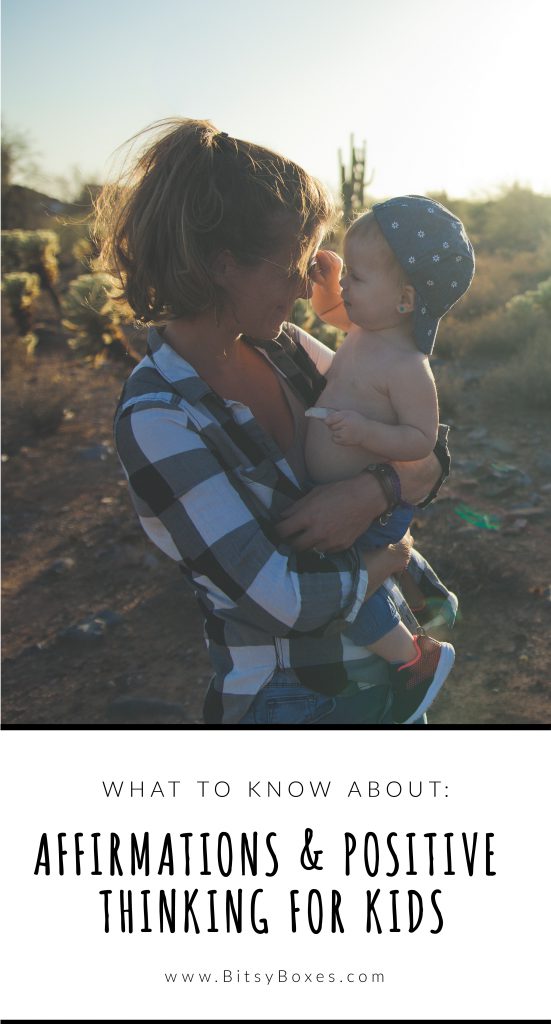Everyone needs a lift sometimes, and that doesn’t exclude little ones! With all the negativity in the world right now, it can be easy to forget to stay positive–this just makes teaching your children positivity even more important! Despite being young, little ones can have bad days, too, and teaching them how to find solutions and see the positive will go along way in helping them handle bigger things later!
Did you know that using positive affirmations can have a huge impact on your child’s frame of mind? Affirmations are, simply put, the practice of positive thinking and self -empowerment. And they’re a great way to remind little ones that they can do anything they put their minds too! Adding affirmations to their daily routines and changing a few habits in your household can go a long way in helping little ones cope with the negativity around them!
Teaching Positivity
You may already be practicing this in your home, but anytime is a great time to start! Adjusting daily life at home and individual routines to focus on the positive is the best way to send your Bitsy out into the world on the right foot! Here are a few ways to get started:
Set an example. Make your home a safe place in a positive environment by practicing positivity and positive thinking yourself! Take a look at how you handle a bad day, or how you come home from work — while it happens to all of us, little ones pay very close attention to the way their parents act! Take a step back and refocus on the positives in your life — creating this atmosphere for Bitsy will automatically enforce better habits!
Motivate them. Make a daily practice to motivate and encourage Bitsy in the things they do. Teaching little ones that they sky is the limit, and they can handle anything they comes their way will build up their natural self-esteem and give them a better outlook!
Help them process. Everyone has a bad day, and this includes toddlers and kids! If they’re having a rough day, feeling angry or upset, or even having a tantrum, help them acknowledge and process those emotions. Teach them that their emotions are valid, real, and normal, but also teach them how to properly handle those emotions.
Problem solving. Each time Bitsy encounters something bad or negative, help them find solutions instead of focusing on the problem! This is a valuable skill for any child to have, and will teach them good habits in all aspects of life.
Encourage what they love. Give your little ones the freedom to explore and find activities they love — then encourage them! This is such an important aspect of building their self-esteem and self-worth, teaching them that what they do matters, and how they feel counts!
Focus on the positive. A great dinnertime activity to start is to ask your Bitsy to recount all the good things that happened to them that day! Practicing this as a daily routine will help them to notice and acknowledge the positive, instead of the bad things that may have happened.
Teaching Affirmations
Another great thing to add to Bitsy’s routine is a positive affirmation — this is a daily thing you and Bitsy can do together to frame their mindset for the day, and kick things off on the right foot! Choose an affirmation that will be a daily reminder that your little one is capable, powerful, and worthwhile. Here are a few affirmations you can try!
- There is no one better to be than myself.
- I am enough.
- I stand up for what I believe in.
- Today I choose to think positive.
- I am free to make my own choices.
- I can get through anything.
- I matter.
- Every day is a fresh start.
- If I fall, I will get back up again.
If Bitsy begins regularly reciting these affirmations of self-esteem and acceptance, they will come to believe them as true–which sets them up for success! Allow your little ones to help decide which affirmations they decide they want to use. Once they’re chosen, try practicing them in the mirror each morning before school — before long, this may become a favorite routine for you both!
With everything little ones face going out into the world these days, having a positive mindset, encouraging parents, and good self-esteem will set your Bitsy up for success day after day! Bottom line? Show them the good in their world, and how to take notice–you’ll both be happier for it!
